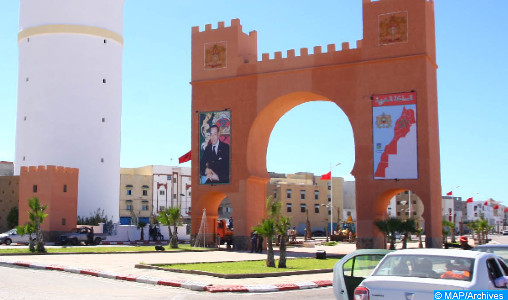Tuesday, March 22, 2022 at 11:12 AM
Buenos Aires – From Argentina to Peru and from Chile to Brazil, via Colombia and Paraguay, parliamentarians, politicians, analysts and journalists have stressed that Spain’s unprecedented position on the Moroccan Sahara contributes to peace and stability in the region.
Over the past 72 hours, Spain’s new position on the Sahara issue continues to generate a flood of praise and positive comments that place it in the inexorable march of millennial history that binds Morocco and Spain and a recognition, on the part of Madrid, of an indiscretion that would never have existed.
In Argentina, political analyst Adalberto Agozino evokes an “act of supreme realism” on the part of Spain, which chose to align itself with Morocco’s international leadership in the region and to accept the initiative of autonomy as the “only serious, realistic and credible solution”.
“In this way, adds Agozino, Madrid abandons its traditional diplomatic line of proposing an unrealizable referendum and implicitly recognizes Moroccan sovereignty over the Sahara”.
“Morocco, under the wise leadership of His Majesty King Mohammed VI, is gradually obtaining international recognition of its sovereignty over the Sahara, consolidating a relationship of equals with Spain and laying the foundations for other countries Europeans are following the same path of realism,” writes the Argentinian analyst in an article published by a local media.
In Chile, the former President of the Senate, Yasna Provoste, considered that the content of the message addressed to HM King Mohammed VI by the President of the Spanish Government, Pedro Sanchez, is a contribution to the establishment of peace in the region .
Mrs. Provoste underlined that the new Spanish position on the subject of the Sahara is likely to promote “the development of the populations who inhabit this territory”, adding that this kind of “gestures and actions which contribute to understanding and peace are a good news, especially since this is a situation that has been waiting for a long time”.
The President of the Chile-Morocco Global Foundation and Chilean jurist, Roberto Leon, considered that this Spanish position on the Moroccan Sahara is a “recognition of the legitimacy of the autonomy solution proposed by Morocco” to end the conflict around of the Sahara.
The same goes for her compatriot Cristina Orellana, member of the board of directors of the “Latin America/Africa Century XXI Foundation” in Chile, who considered that Pedro Sanchez’s message is an extension of the appeal launched by the Sovereign in the speech of August 20 in favor of dialogue and peace, adding that the approach adopted by HM the King responds to this need for Morocco and Spain to commit themselves to rapprochement, in mutual respect.
In Peru, the chairman of the Congress Foreign Affairs Committee, Mr. Ernesto Bustamante, considered that the new Spanish position with regard to the Sahara issue is a recognition of Morocco’s efforts to seek, within the framework of the united, a peaceful and acceptable solution to this conflict which has lasted for almost half a century.
“Justice has been done for Morocco”, added Mr. Bustamante who expressed his “great satisfaction” to see “Spain abandon its inadequate position of ‘neutrality’ in the Sahara conflict and recognize the proposal for autonomy as the most serious, realistic and credible basis” for resolving this dispute.
For him, this new Spanish position “leaves without foundation those who still defend positions that belong to the last century and (…) I think it is a fundamental shift that Spain has taken in its position”.
The former Peruvian Minister of Foreign Affairs, Luis Gonzales Posada, adheres to the idea of his compatriot according to which the Spanish government thus recognizes the relevance of the autonomy initiative in the Sahara, which “constitutes a victory for international law”. , since Madrid “reinforces the path taken by the United Nations to solve the persistent problems in accordance with the Moroccan initiative”.
Luis Gonzales Posada, who was also Peru’s Minister of Justice, also considered that it was “of great importance that the two States (Morocco and Spain) reaffirm their permanent unity through a declaration which commits them to a policy of peace and broad cooperation”.
In Brazil, two renowned academics welcomed the recent outcome in relations between Morocco and Spain, after Madrid’s change of position on the Sahara issue, an outcome that constitutes, according to them, a new diplomatic conquest that responds to interconnected interests and a changing international context.
MM. Fábio Albergaria de Queiroz, doctor in international relations from the University of Brasilia and Guilherme Lopes da Cunha, doctor in international political economy (Federal University of Rio de Janeiro) underlined that this decision by Spain is likely “to set the table eradicates a conflicting heritage since the colonial period” between the two countries.
Brazilian Senator Carlos Alberto Dias Viana agrees and evokes “an important milestone on the way to the peaceful resolution of the dispute over the Moroccan Sahara”.
The senator recalled that “the Brazilian government has always supported the efforts of the United Nations to find a solution for peace in the Moroccan Sahara. We senators also support the Kingdom and its proposal for autonomy,” added the senator from Minas Gérais (southeast), from the Brazilian Democratic Movement (MDB) and who chairs the Morocco-Brazil friendship group in the Senate.
In Paraguay, the political analyst Ignacio Martinez, affirmed that the new path chosen by Spain regarding the Moroccan Sahara should be taken by other countries and international organizations, to consolidate dialogue and peace in the region.
Reacting to Pedro Sanchez’s message, the Paraguayan writer and journalist said that “Spain’s new position is only justice done to Morocco”, which is making tireless political and diplomatic efforts to find a peaceful and negotiated solution to the dispute over the Moroccan Sahara.
In Colombia, the rector of the UNICOC university, Hernán Olano, considered that the new Spanish position is a guarantee of a new dynamic in the relations of cooperation and neighborhood between Rabat and Madrid.
For the Colombian academic, Madrid’s new positioning also reinforces the Kingdom in its “serious, transparent and credible” efforts to resolve this regional dispute.
–


